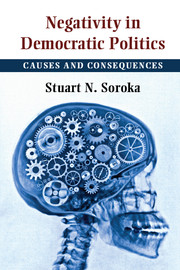Book contents
1 - On Negativity
Published online by Cambridge University Press: 05 June 2014
Summary
You can't have a light without a dark to stick it in.
– Arlo GuthrieA December 2012 op-ed in the Moscow Times described State Duma Deputy Oleg Mikheyev's proposal to force Russian media to report more good news. Mass media would have to shift the amount of positive information to 70 percent and restrict bad information to the remaining 30 percent. Too much bad information was said to damage the human psyche – indeed, it “weakens their ability to think and lowers their creative powers.” Michael Bohm, opinion editor of the Times, was of course critical of Mikheyev's (preposterous) bill. Among his reasons, Bohm wrote, “Mikheyev has got the cause-effect relationship of negative information all wrong. The media is much less a cause of society's ills than it is a mirror image of those ills.”
Media are certainly as much a reflection as they are a driver of public attitudes. For the most part, media do not make us negative – they reflect our negativity. But whether that negativity is an “ill” is another matter. Focusing on negative information may be a perfectly reasonable means for citizens to monitor their environment, and particularly their governments. Ongoing negativity in politics and political communication may be a problem, but it may also be effective and advantageous.
- Type
- Chapter
- Information
- Negativity in Democratic PoliticsCauses and Consequences, pp. 1 - 14Publisher: Cambridge University PressPrint publication year: 2014



